To clean your perfume spray bottles effectively, you'll need warm water, vinegar, mild soap, and rubbing alcohol. Start with a quick warm water rinse, then try the vinegar-water solution for deeper cleaning. Add uncooked rice for stubborn residues, and use alcohol for sanitizing. Don't forget to disassemble the spray mechanism and clean each component separately. For delicate bottles, stick to gentle solutions and soft brushes. These proven methods will transform your perfume bottle maintenance routine.
The Vinegar and Water Deep Clean Method
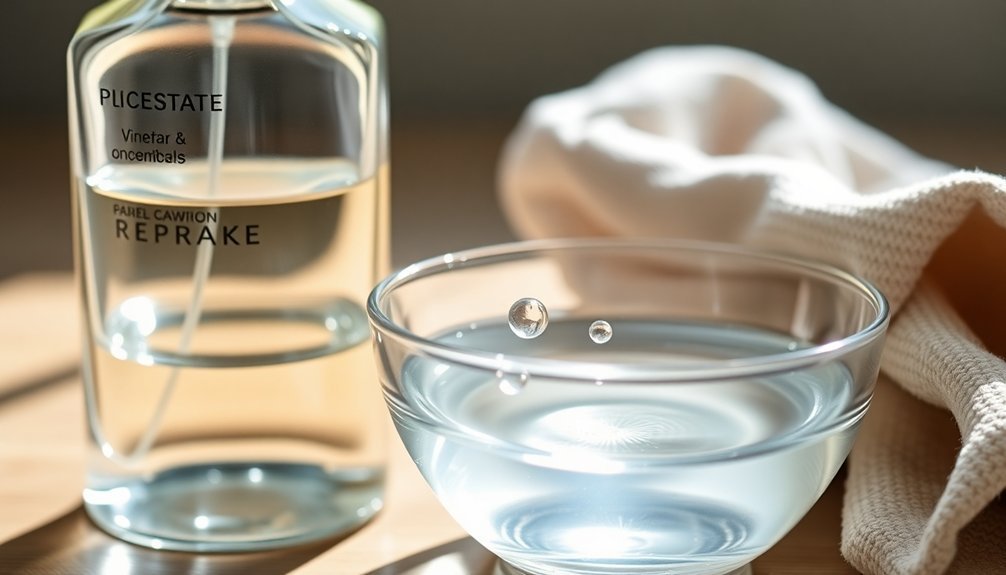
Deep cleaning a perfume spray bottle doesn't have to be complicated. You'll need equal parts white vinegar and warm water – about half a cup of each. This mixture effectively dissolves oily residues without damaging the glass surface.
Pour the solution into your bottle and let it sit for an hour. For stubborn residues, add a small amount of raw rice and a teaspoon of mild detergent. Gently shake the bottle to let the rice work as a natural scrubber. The combination will remove up to 90% of surface oils while preserving the bottle's integrity.
After cleaning, rinse thoroughly with warm water multiple times until all cleaning agents are gone. Let the bottle air-dry completely before refilling it with perfume. Using a small brush for details can help clean intricate designs and hard-to-reach areas of decorative bottles.
This method will keep your sprayer functional and prevent old scents from mixing with new ones.
Quick Warm Water Rinse Technique
A gentle stream of warm water serves as your first line of defense against stubborn perfume residues.
You'll want to avoid hot water, as it can damage the bottle's components. Instead, use warm water to prepare your bottle for deeper cleaning methods while effectively removing visible residue from both interior and exterior surfaces. Adding a few drops of mild liquid soap helps attract and eliminate surface oils.
Follow these key steps for the best results:
- Run warm water gently through the bottle to prevent pressure damage.
- Rinse multiple times to guarantee complete residue removal.
- Keep the bottle well-ventilated during the process.
You can combine this technique with other cleaning methods, like vinegar solutions or mild soap scrubs.
Remember to clean in a well-ventilated area and use soft brushes for stubborn spots.
Don't use a dishwasher, as it can crack your perfume bottles.
Rice and Soap Scrubbing Solution
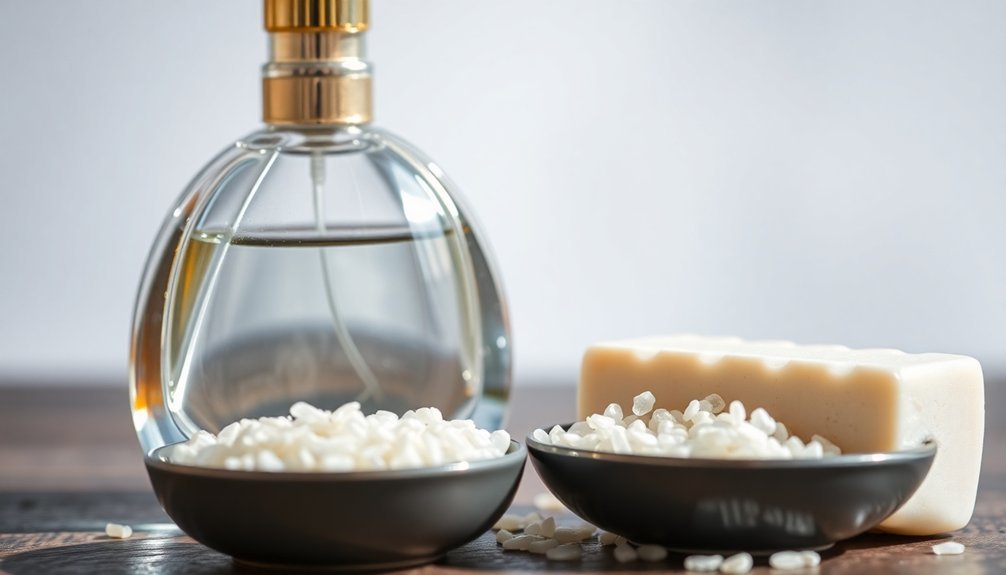
You'll find that uncooked rice mixed with mild dish soap creates a powerful yet gentle cleaning solution for your perfume bottles.
For the perfect mixture, combine one teaspoon each of uncooked rice and mild dish soap with warm water, filling the bottle halfway.
Shake the bottle in small, controlled motions to let the rice work as a natural scrubber, effectively removing residue without damaging the glass surface. Let the solution sit for one hour to thoroughly break down stubborn residue and oils.
Natural Scrubbing Power
When cleaning perfume spray bottles, combining uncooked rice with mild dish soap creates a highly effective natural scrubbing solution. These natural ingredients work together perfectly – the soap breaks down oils and residue, while rice acts as a gentle abrasive that won't scratch your glass bottles.
For the best results, follow these simple steps:
- Add a small amount of uncooked rice and mild dish soap to your empty bottle.
- Gently shake the mixture to guarantee it reaches all internal surfaces.
- Let the solution sit for about an hour before rinsing thoroughly.
You'll find this method particularly effective because it's gentle on your bottles while being tough on residue. It's also cost-effective and environmentally friendly, using common household items instead of harsh chemicals that could damage your bottles or harm the environment.
Perfect Ratio Guide
Now that you understand the power of rice and soap cleaning, getting the measurements right will maximize your results.
You'll need one teaspoon each of mild liquid soap and raw rice, combined with warm water to fill at least half of your perfume bottle. For enhanced cleaning power, mix equal parts white vinegar and warm water.
Make certain you're using gentle, mild soap to protect delicate bottle components. Fill the container with enough solution to allow the rice grains to move freely when shaking.
You'll want to guarantee proper distribution of the cleaning agents throughout the bottle. Don't forget to work in a well-ventilated area while cleaning.
After shaking the mixture thoroughly, rinse completely with warm water to remove all cleaning agents and prevent any residue from building up.
Gentle Shaking Technique
The rice-and-soap shaking method requires a delicate touch to effectively clean your perfume bottle without damaging it. Simply combine a few grains of rice with warm water and mild soap inside your bottle, then gently shake to let the rice work as a natural, non-abrasive scrubber.
For best results, follow these key steps:
- Let the mixture sit for about an hour to help break down stubborn residue.
- Shake the bottle periodically using gentle, circular motions.
- Rinse thoroughly with clean water until all soap is removed.
The beauty of this technique lies in its simplicity and safety – rice won't scratch your bottle's surface, while soap effectively dissolves oils and grease.
Once you're done, let the bottle air dry completely before storing or refilling it.
Essential Alcohol Sanitizing Process
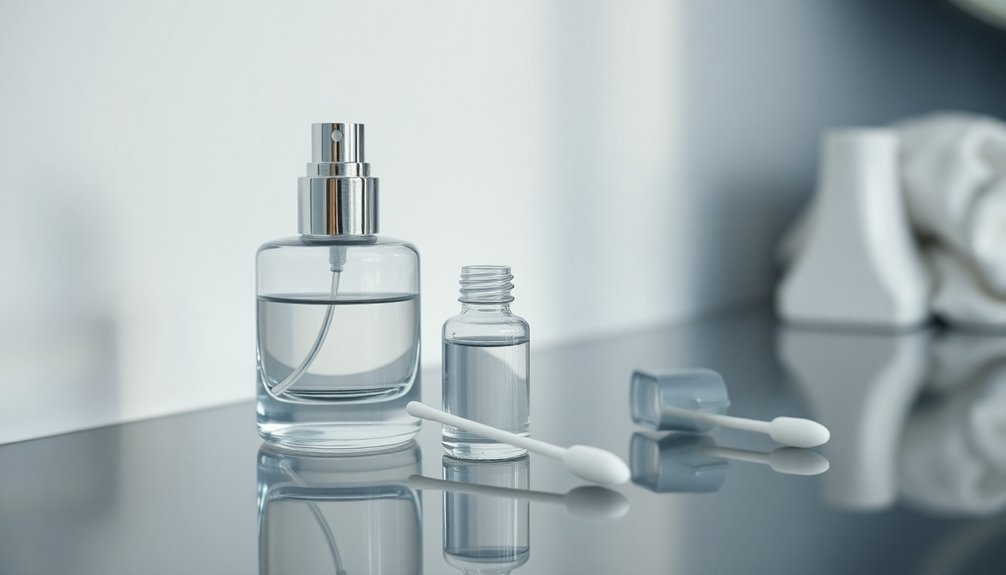
You'll need to carefully dilute your isopropyl or ethyl alcohol to a 70% concentration for ideal sanitizing power.
Let the bottle components soak in the alcohol solution for 2-3 minutes, ensuring complete coverage of all surfaces including the spray mechanism and cap.
After soaking, remove each part separately and place them on a clean, lint-free cloth to air dry thoroughly before reassembly.
Alcohol Dilution for Cleaning
When cleaning perfume spray bottles, proper alcohol dilution plays an essential role in achieving ideal sanitization.
You'll want to use high-proof ethanol, typically around 96% concentration, as it's most effective at dissolving perfume residues and oils completely.
While you can use undiluted alcohol, creating a custom solution offers better control and safer handling.
Here's what you need to know about diluting alcohol for cleaning:
- Start with 91% isopropyl alcohol as your base
- Add distilled water to achieve your desired concentration
- Mix thoroughly and store in a sealed container
You'll find that properly diluted alcohol solutions work faster than other cleaning methods like rice or soap, while leaving no residual scents that could affect your next fragrance.
The solution evaporates quickly, ensuring your bottle is ready for immediate use.
Effective Soaking Time Guide
Proper soaking times determine the success of cleaning perfume spray bottles effectively.
You'll need to soak your bottles overnight in a solution of equal parts white vinegar and warm water to remove stubborn residues. This method works particularly well for glass containers, though plastic bottles may require extra attention.
Add a small amount of raw rice to your soaking solution – it acts as a gentle abrasive to help scrub the interior.
While soaking, avoid harsh chemicals like acetone that can damage your bottles. Instead, stick to mild soap and vinegar solutions.
After the overnight soak, rinse your bottle thoroughly at least three times with warm water to remove all cleaning agents. Let it air dry completely before storing or reusing to prevent moisture-related issues.
Sanitizing Different Spray Components
After a thorough soak, each spray component requires specific sanitizing methods for ideal results.
You'll want to focus on using a 96% ethanol solution for maximum sanitization, particularly for the intricate spray mechanisms and nozzles where perfume residue tends to accumulate.
- Start by disassembling the spray mechanism completely, then dip each part in ethanol for 2-3 minutes.
- Use a precision brush to clean hard-to-reach areas while the components are still wet with ethanol.
- Allow all parts to air dry completely before reassembly to prevent any moisture-related issues.
Remember to handle delicate components with care during the sanitizing process.
For stubborn residues, you can combine ethanol with a gentle vinegar solution, but always verify thorough rinsing and complete drying before putting everything back together.
Safe Disassembly and Component Care

Successfully disassembling a perfume spray bottle requires careful attention to both safety and technique. You'll need rubber gloves for better grip and cloth-wrapped tools to prevent scratches.
Before starting, identify your bottle's cap type – whether it's a screw-top, snap-on, crimp-top, rollerball, or atomizer – as each requires different handling methods.
When removing components, don't force stuck parts; instead, use warm water to loosen them gently. Clean each piece with rubbing alcohol and a lint-free cloth, paying special attention to nozzles and small crevices.
You can use fine brushes for detailed cleaning of tight spots. Before reassembling, verify all parts are completely dry. Test the spray mechanism after putting everything back together to confirm it's working properly.
Natural Residue Removal With Citrus
You'll find citrus-based cleaning methods offer powerful yet gentle solutions for removing stubborn perfume residues from spray bottles.
Starting with a lemon peel soak provides natural solvents that break down old fragrances, while fresh orange juice treatments can tackle particularly resistant buildup.
For the most thorough cleansing, essential oils derived from citrus fruits deliver deep cleaning power that eliminates lingering scents without damaging your bottles.
Lemon Peel Soak Method
A natural and eco-friendly approach to cleaning perfume spray bottles involves using the natural cleaning power of citrus peels combined with white vinegar. The citric acid and D-limonene in lemon peels work together with vinegar's antimicrobial properties to break down stubborn residue and eliminate odors.
To create your citrus cleaning solution:
- Fill a glass jar with organic citrus peels and white vinegar
- Let the mixture soak for 1-3 weeks, shaking occasionally
- Strain the solution using a fine-mesh strainer or cheesecloth
You'll want to store your cleaning solution in a cool, dark place.
When you're ready to clean your perfume bottles, you can use the solution at full strength or dilute it with water. This method works best on sealed surfaces and won't damage your spray bottles.
Fresh Orange Juice Treatment
Building on the concept of citrus-based cleaning, fresh orange juice treatment offers another natural approach – though with important limitations.
While orange juice contains natural citric acid that could theoretically help break down residues, it's not the best choice for cleaning perfume bottles due to its sticky nature.
Instead of using fresh orange juice directly, you'll get better results by adapting the citrus concept differently.
Consider using citrus-infused vinegar, which you can make by soaking citrus peels in vinegar and then diluting with water.
This solution provides the natural cleaning power of citrus without the risks of sticky residue.
For ideal results, combine this with uncooked rice and a small amount of dish soap to create an effective, natural cleaning solution that won't leave unwanted scents behind.
Essential Oil Deep Clean
Three natural ingredients combine to create an effective essential oil deep clean: citrus-based solutions, vinegar, and gentle soap.
When dealing with stubborn residues in your perfume bottles, this powerful trio works together to dissolve oils while protecting delicate glass surfaces and decorative elements.
For the most thorough clean, follow these steps:
- Mix equal parts white vinegar and warm water, then fill your bottle halfway. Swirl gently to help neutralize lingering scents and break down oil residue.
- Add a few drops of natural citrus-based solution to boost the cleaning power, particularly effective for dissolving essential oil remnants.
- Finally, use a mild soap solution with warm water for a final rinse, ensuring you've removed all traces of the previous fragrance.
Let the bottle dry completely upside down before refilling.
Steam Cleaning for Delicate Bottles
While steam cleaning is commonly used for various household items, it's not the ideal method for delicate perfume bottles. Instead, you'll want to use gentler alternatives that protect your bottle's integrity while ensuring thorough cleaning.
| Method | Best For |
|---|---|
| Vinegar Solution | Stubborn residue removal |
| Rice & Soap Mix | Deep interior cleaning |
| Soft Brush | Detailed exterior work |
You'll achieve better results using a mixture of equal parts white vinegar and warm water, or try the rice method by combining warm, soapy water with uncooked rice. For intricate designs, use a small brush with soft bristles. Remember to rinse thoroughly after cleaning and dry completely to prevent water spots. Avoid harsh chemicals and rough scrubbers that could damage your delicate bottles.
Long-Term Storage Preparation Steps
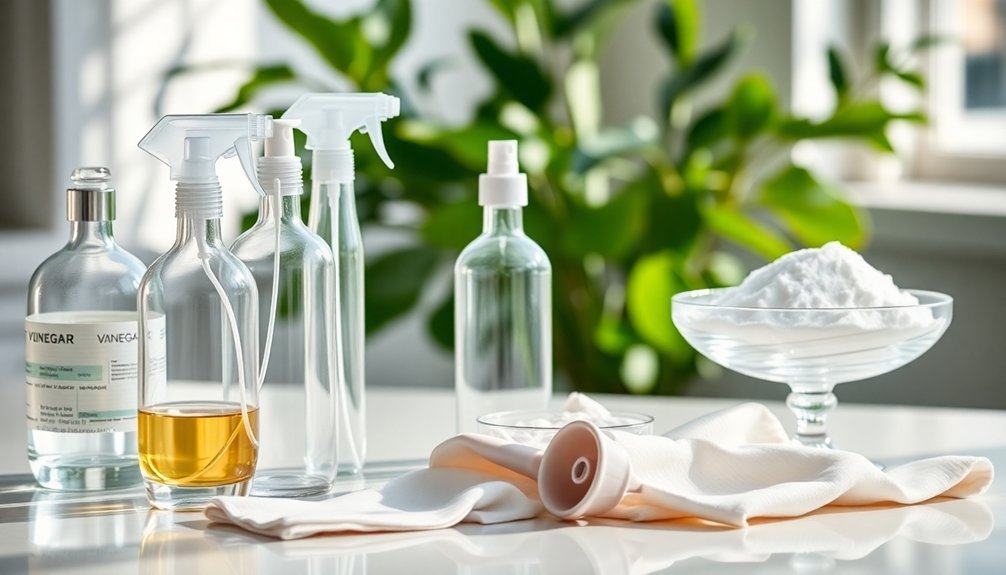
Once you've thoroughly cleaned your perfume spray bottle, proper preparation for long-term storage is essential to maintain its condition.
Before storing, verify your bottle is completely dry by letting it air out in a clean, well-ventilated area. Polish the exterior with a soft cloth to remove any fingerprints or smudges that could tarnish the surface over time.
For successful long-term storage, follow these key steps:
- Choose a cool, dry storage location away from direct sunlight and humidity
- Label your bottle clearly if you're storing multiple containers, including the date of cleaning
- Inspect your stored bottles every few months for signs of damage or residue buildup
Regular maintenance checks will help preserve your bottles' condition and verify they're ready for reuse whenever needed.
Professional-Grade Sanitizing Methods
Professional sanitizing methods provide a deeper level of cleanliness that surpasses basic washing techniques.
Professional cleaning methods elevate sanitization beyond everyday washing, ensuring a more comprehensive and thorough level of cleanliness.
You'll achieve the best results by using an ultrasonic device combined with appropriate sanitizing solutions, such as gentle soap or rubbing alcohol mixtures.
For thorough sanitization, soak your spray bottle components in a vinegar solution or sodium carbonate mixture.
Use cotton swabs and small brushes to clean hard-to-reach areas. If you're dealing with glass components, run them through a dishwasher's sanitizing cycle for ideal results.
Don't forget to address lingering odors with a baking soda solution or acetic acid treatment.
After sanitizing, rinse all parts thoroughly and place them on a drying rack.
For sensitive applications, consider using specialized sterilizing fluids as a final step before storage.
Daily Maintenance and Prevention Tips
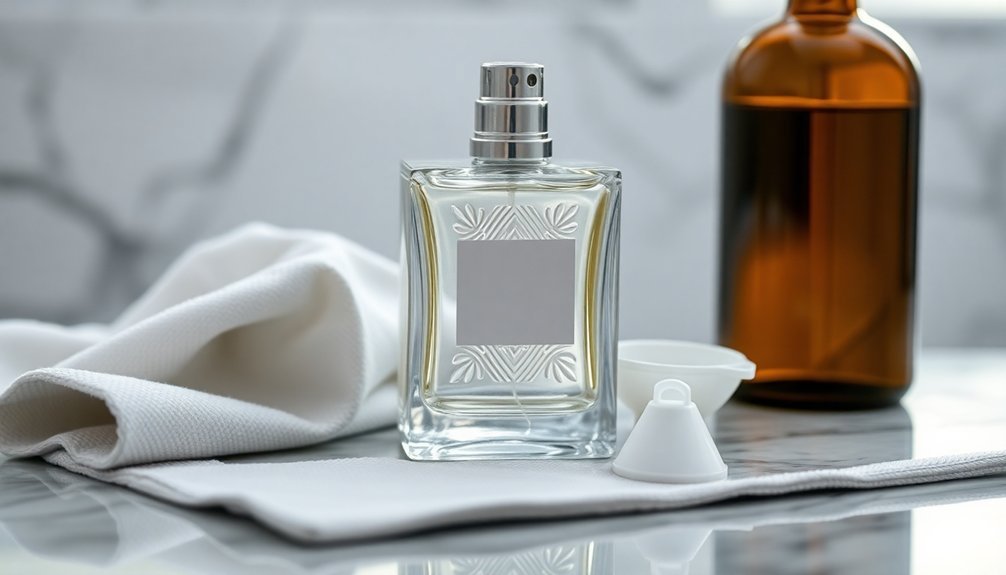
To maintain your perfume spray bottles in ideal condition, you'll need to establish a consistent daily cleaning routine. A quick rinse with warm water and mild dish soap can prevent residue buildup and keep your fragrances fresh.
Don't forget to inspect the spray mechanism regularly for clogs or damage.
Store your bottles properly and follow these essential maintenance tips:
- Keep your perfumes in a cool, dry place away from direct sunlight and extreme temperatures to preserve their quality.
- Clean your atomizer between different fragrances to avoid mixing scents and potential contamination.
- Use gentle cleaning tools like soft brushes for intricate bottle designs, and avoid harsh chemicals that could damage the components.
Remember to rinse thoroughly after cleaning to remove all soap residue, and don't shake bottles vigorously, as this can create unwanted air pockets.
Frequently Asked Questions
Can I Reuse a Perfume Bottle for a Different Fragrance?
Yes, you can reuse perfume bottles for different fragrances, but you'll need to clean them thoroughly first. Remove all traces of the old scent, clean with warm water and mild soap, and make certain it's completely dry.
How Do I Remove Dried Perfume Crystals From Spray Nozzles?
You'll need to soak the nozzle in warm water with detergent, then use denatured alcohol to dissolve crystals. Add raw rice for scrubbing, or try a vinegar solution for stubborn residue.
What's the Safest Way to Clean Antique or Vintage Perfume Bottles?
You'll want to soak your antique bottles in warm water with white vinegar. Use cotton swabs for delicate areas, and gently clean with soft brushes. Don't use harsh chemicals, as they'll damage labels.
Will Cleaning Affect the Bottle's Metallic or Decorative Coating?
Yes, harsh cleaning can damage your bottle's coatings. You'll want to use gentle soap solutions and avoid abrasive materials. Don't use vinegar on metallic finishes, as it can strip or corrode decorative elements.
How Often Should I Deep Clean My Perfume Bottles?
You should deep clean your perfume bottles at least once a year, or more frequently if you use them regularly. Clean them before storage, when there's visible residue, or when you're switching to a different fragrance.
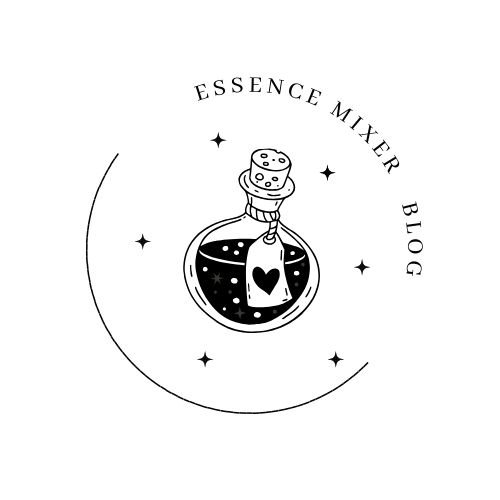
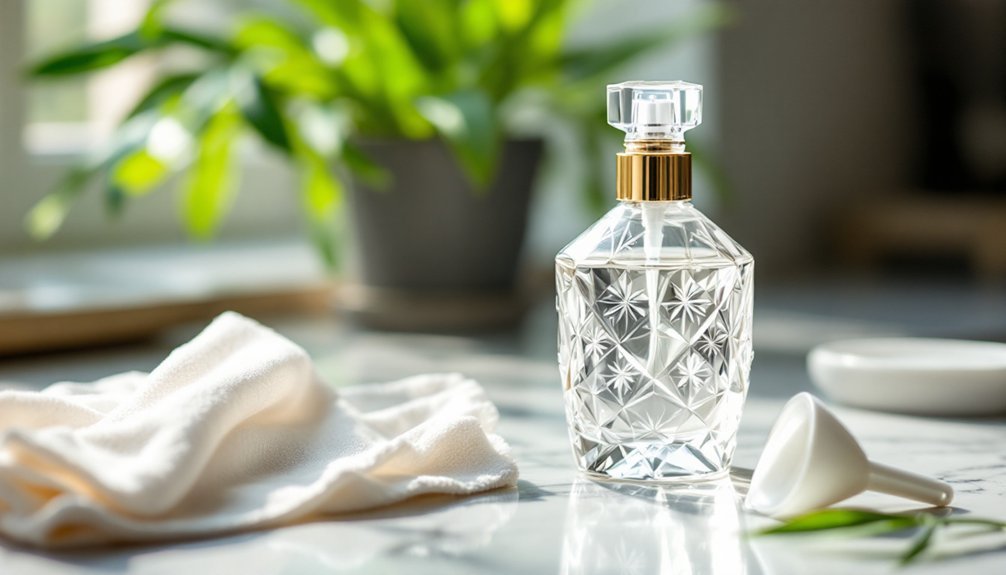
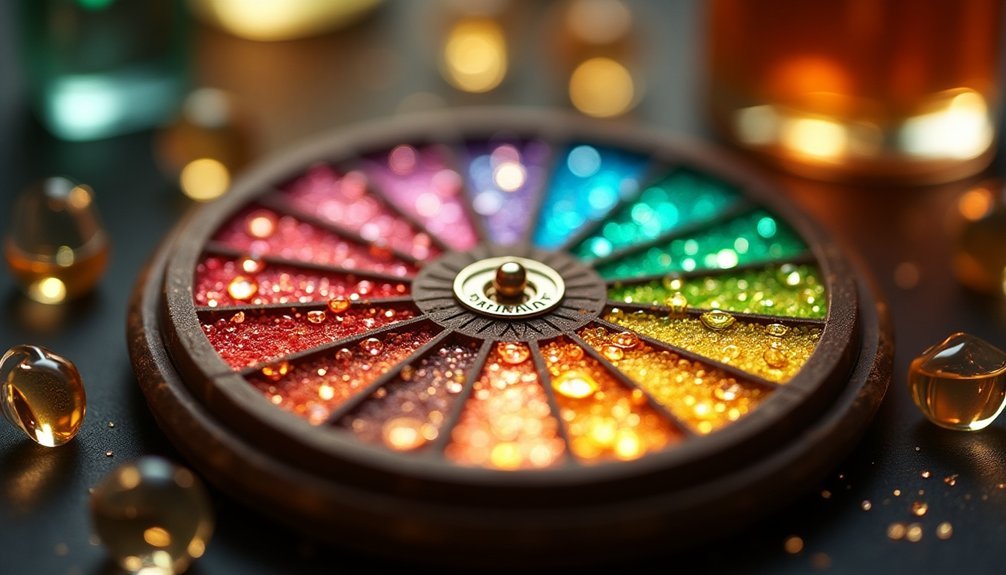
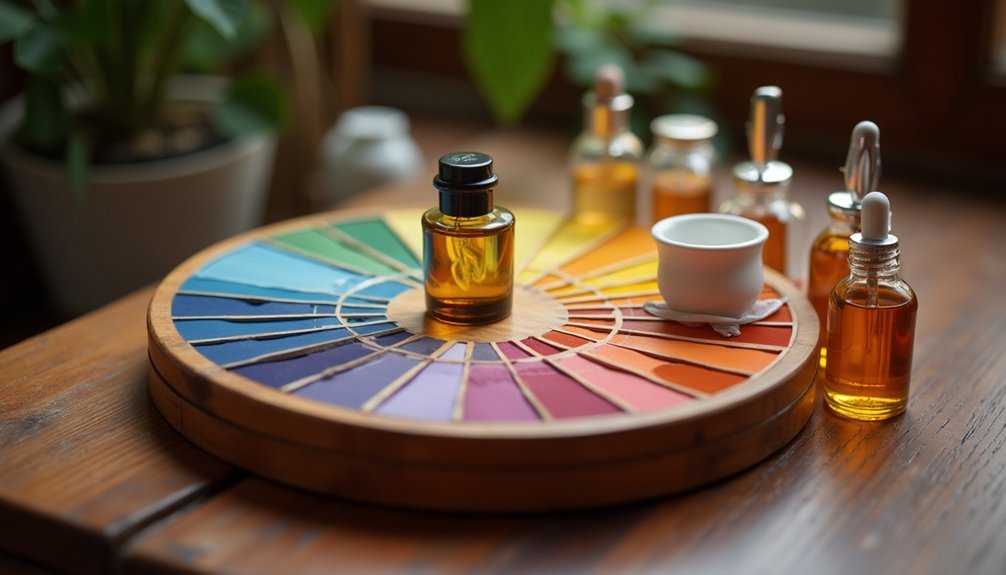
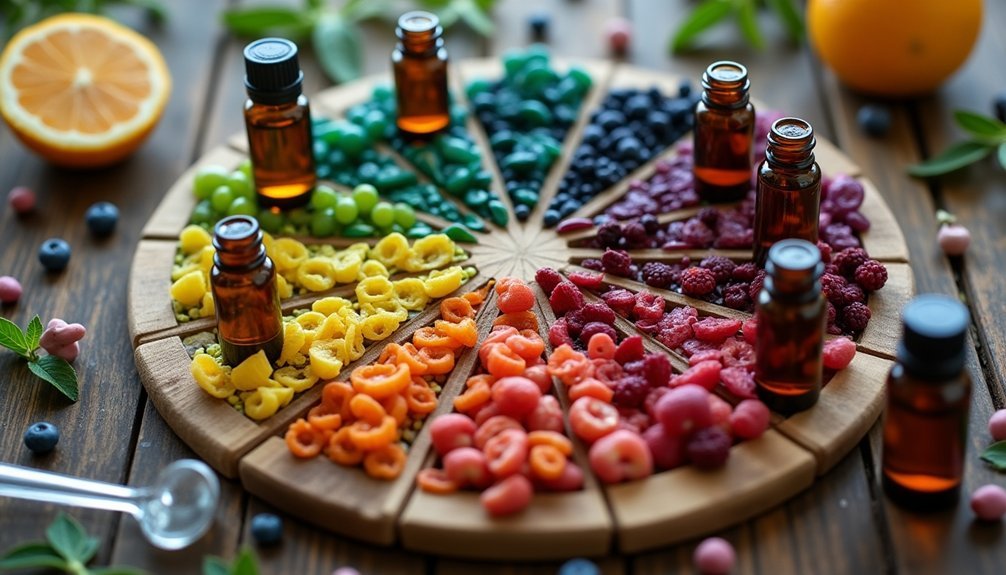
Leave a Reply